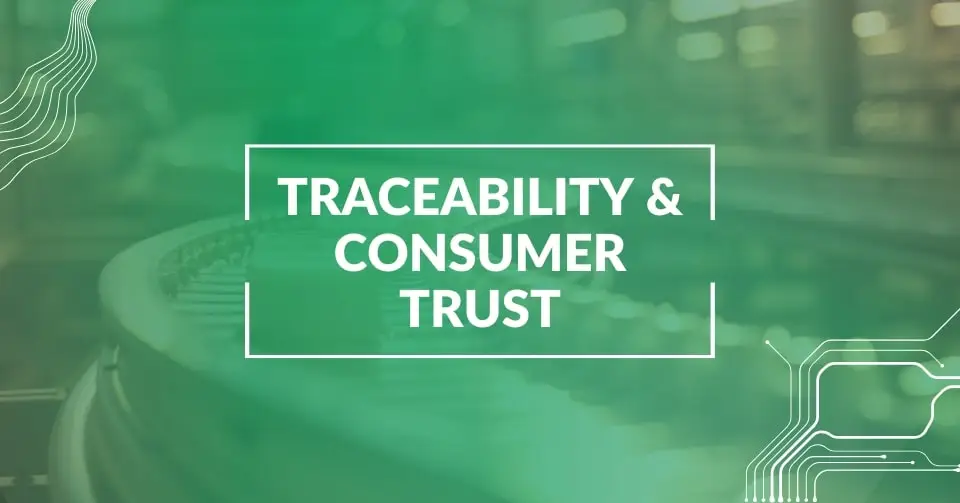Trust is essential in the food and beverage industry, especially concerning numerous recalls and contamination cases we read about in the news headlines. These events cause concerns among consumers.
A recent 2024 IFIC Spotlight Survey showed that nearly one-third of Americans are highly concerned about E. coli in ground beef (32%). A slightly lower percentage of people express the same level of concern for lead, cadmium, and/or arsenic in baby food (29%) and mercury in seafood (27%). Less than 1 in 6 are deeply concerned about allergens in packaged foods (16%) and allergens in foods served at restaurants (15%).
Following food traceability requirements helps restore and maintain consumer confidence in food. It enables manufacturers to track ingredients in the supply chain, ensuring safety, visibility, and accountability.
In this blog, I will explain how end-to-end food traceability can improve consumer confidence, the obstacles to gaining it, and what traceability solutions can help you build stronger customer trust.
Why Is Consumer Confidence in Food Products Important?
In a competitive food industry, businesses must stand out and gain consumer trust.
Customers are now more likely to choose brands prioritizing food transparency and commitment to food safety. People are concerned about where their food comes from, whether it’s allergen-free, vegan, non-GMO, etc. You can become a top choice if you prove you contribute to one of several of these factors.
Trust drives consumer purchasing decisions. Buyers now demand more information about products before they buy them, and providing people with this data will help you win their trust. Otherwise, consumers can switch to your competitor or even stop using a specific product category.
Another crucial aspect is that customers bring you profit. A lack of consumer trust can result in declining sales, increased scrutiny, and long-term brand damage.
You must proactively invest in a food traceability system and food safety to prevent adverse outcomes like consumer skepticism and the need to rebuild your reputation again.
How Does Food Traceability Strengthen Consumer Trust?
Food Safety and Recall-Readiness
Food safety is a top priority for both manufacturers and consumers. Contamination incidents can undermine a company’s reputation among consumers. A food traceability system helps ensure a high level of food safety.
Moreover, traceability makes you ready to respond to recalls faster and more efficiently. McDonald’s E. coli outbreak is an example of how a food recall compromises consumer confidence in food.
The company noted that the customer visits weakened after the outbreak that started on October 22.
Meeting the Food Transparency Demand
Implementing a food traceability system helps create transparency and meet customer demand for information on the food’s origin.
You’ll be able to provide verified data. For instance, you could provide scannable QR codes, and people could access the information themselves. This way, you can build your reputation and trustworthiness.
Preventing Food Fraud and Verifying Food Authenticity
Food fraud is a burning issue in the food manufacturing industry. Your goal is to avoid fraudulent products from entering the market and deceiving your buyers.
With a proper food traceability plan, you prove your product’s authenticity. Customers who know what they buy will likely stay loyal to your brand.
Food traceability technologies can help prove your product is authentic. They can record every supply chain step and provide traceability records.
Challenges in Gaining Consumer Trust Through Traceability
Some circumstances can make it difficult for food manufacturers to make consumers feel confident about the products they buy. You need to overcome some obstacles to communicate your traceability efforts.
Lack of Awareness
While food manufacturers are well aware of the importance and role of food traceability, many consumers may not know about it, which can lead to skepticism.
To overcome the obstacle, you should explain how traceability enhances food safety to your customers. Educate your customers through different channels, such as food packaging, social media, or company websites.
Allow your customers to scan QR codes on the packaging to learn about the product’s origin and safety measures.
Lack of Trust
This can be due to previous incidents that happened to your clients, vague data provided, or any other situation after which customers may question the accuracy of traceability data.
To reassure consumers, provide food safety certifications to prove your commitment to food safety. Leverage food traceability software to provide solid traceability records. Finally, be fully transparent about your sourcing, processing, and safety measures.
Supply Chain Complexity
It seems like a never-ending issue for many aspects of food manufacturing. Complex supply chains that span multiple countries, suppliers, and processing facilities are complex to handle. You need to keep track of every step to ensure consistency in traceability data.
However, you can alleviate this hardship by implementing a standardized food traceability system, collaborating with suppliers to guarantee accurate record-keeping, and using a cloud-based traceability software solution. It will centralize your operations and manage multiple stakeholders simultaneously.
How To Ensure Consumer Confidence Through Food Traceability?
I’ve already mentioned ways and tricks, but let’s dive deeper into it and summarize what food traceability practices you should implement. It requires a strategic approach, so here are some tips from us.
- Build a robust food traceability system. Establish record-keeping and real-time data capture procedures to ensure quick recall response and supply chain visibility.
- Implement food traceability software and other technologies. The software will help you manage and streamline traceability on a single platform. Other solutions, such as blockchain, RFID, barcode scanners, etc., will help ensure comprehensive monitoring and data collection.
- Maintain food safety compliance. Implement the FDA Food Traceability Rule (FSMA 204) and work on adherence to other standards and regulations. Compliance documents from your suppliers are also required. Remember about compliance records.
Consider leveraging third-party certifications, such as Hazard Analysis and Critical Control Points (HACCP) certification or Global Food Safety Initiative (GFSI) certification. It will boost your credibility.
- Continuous improvement. Remember to regularly monitor consumer feedback and industry trends to enhance traceability practices. You should also periodically scale and update your software and other technologies to improve efficiency and accuracy.
Food traceability can significantly boost your brand reputation and ensure customer confidence and satisfaction, and following these steps can help you achieve that.
Do you need guided support to enhance your food traceability efforts? Schedule a meeting with FoodReady to see what we can do for you!
From Farm to Fork, Build Trust That Lasts
See how FoodReady helps you meet FSMA 204, prevent recalls, and prove product authenticity.
How Food Traceability Software Strengthens Consumer Confidence?
Food traceability software is a game-changer, given the great demand from food manufacturers for transparency and accountability. FoodReady software will help ensure compliance with food safety regulations and build trust.
The software enables manufacturers to track ingredients from farm to fork. Its comprehensive features, including real-time monitoring, supplier management, document control, etc., help reduce the risk of fraud and provide verifiable origin, handling, and safety data about your product.
One of our customers, True Essence Foods, shared their experience using FoodReady for traceability and tracking. They mentioned, “The traceability FoodReady provided with recording, tracking, and the ability to search historical data was excellent to aid in our SQF goal.” (Amanda Turner, QA Manager).
Become one of our customers, and together, we will work on your comprehensive and efficient food traceability system, which will help you be the best choice among your customers.
Conclusion
Customer confidence and loyalty are crucial for food manufacturers because they influence brand reputation and profitability.
Food traceability is one of the ways you can win and maintain client trust. It happens in many ways:
- You ensure transparency.
- You prove that your products are safe to eat.
- If a recall happens, you respond to it fast.
However, implementing this strategy can be challenging (but manageable). You may face problems like trust issues, resistance to change, product inconsistency, and complex supply chains.
To make your strategy work, develop a food traceability system, implement digital solutions, leverage food safety certifications, and don’t forget about FSMA 204 compliance! What’s more, drive continuous improvement to stay up to date and satisfy your customers.
Even if it’s hard at first, it’s definitely worth it! Food traceability is crucial for ensuring food quality and safety and is fundamental to providing credible information to your clients.
Want to start now? Book a demo with FoodReady to define the next steps in building food traceability for your brand.
FAQs
Yes, it can. Today’s food traceability software solutions can seamlessly integrate with ERP (Enterprise Resource Planning) and MES (Manufacturing Execution Systems). It helps create a smooth workflow and improve efficiency and compliance.
Yes, food traceability software solutions can fit the budget of small and medium enterprises. Businesses can implement cloud-based software without high implementation costs.
Food traceability helps track supply chains so companies can ensure fair labor practices, prevent exploitation, and verify ethical sourcing. This positively impacts consumer confidence in brand integrity.
Restaurants can ensure transparency by showcasing locally sourced ingredients, implementing digital menu transparency, and providing real-time supply chain insights. These practices reassure customers about the quality of the food served.








